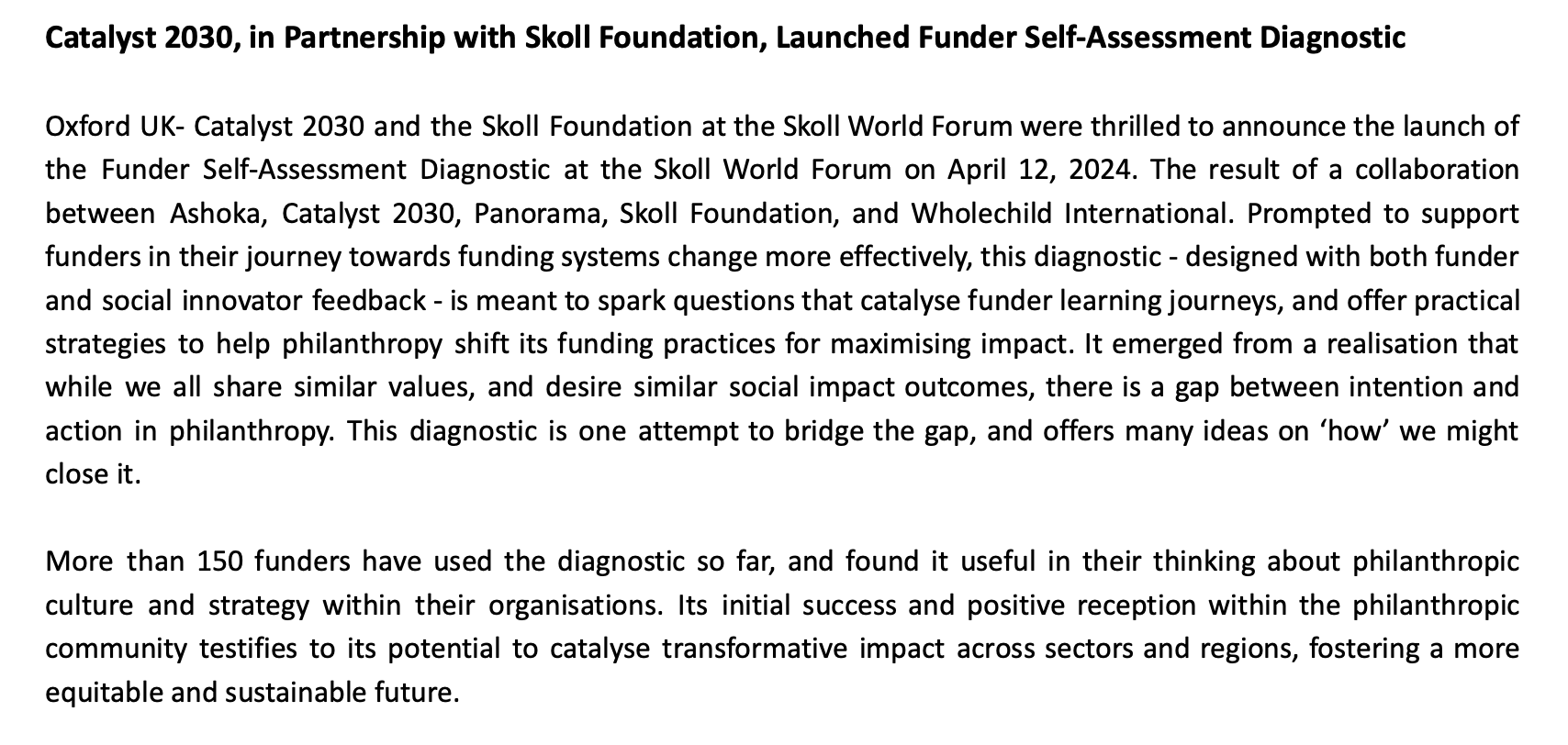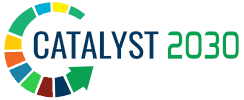
Catalyst 2030, in Partnership with Skoll Foundation, Launched Funder Self-Assessment Diagnostic
Oxford UK- Catalyst 2030 and the Skoll Foundation at the Skoll World Forum were thrilled to announce the launch of the Funder Self-Assessment Diagnostic at the Skoll World Forum on April 12, 2024. The result of a collaboration between Ashoka, Catalyst 2030, Panorama, Skoll Foundation, and Wholechild International. Prompted to support funders in their journey towards funding systems change more effectively, this diagnostic – designed with both funder and social innovator feedback – is meant to spark questions that catalyse funder learning journeys, and offer practical strategies to help philanthropy shift its funding practices for maximising impact. It emerged from a realisation that while we all share similar values, and desire similar social impact outcomes, there is a gap between intention and action in philanthropy. This diagnostic is one attempt to bridge the gap, and offers many ideas on ‘how’ we might close it.
More than 150 funders have used the diagnostic so far, and found it useful in their thinking about philanthropic culture and strategy within their organisations. Its initial success and positive reception within the philanthropic community testifies to its potential to catalyse transformative impact across sectors and regions, fostering a more equitable and sustainable future.
The diagnostic leads to a bold invitation to the philanthropy community, to reflect on their own journey. How will you seek out grantees? When it comes to success, measurement is important, but are we willing to measure the right metrics that point to systems change? How do we invite boards and other key stakeholders on a journey to consider what success can look like? What percentage of our portfolio can be unrestricted? Multi-year? By embracing these questions, the diagnostic opens up a learning journey for visionary and bold funders towards transformative grantmaking culture and practice, that can usher in an era of innovative and high impact funding.
During the 2024 Skoll World Forum, a session titled “A Blueprint for Better Giving: Philanthropy for Systems Impact” took centre stage. The session featured three remarkable speakers: Bernadette Moffat, Executive Director of ELMA Philanthropies Services, Hilary Pennington, EVP of Global Programs at the Ford Foundation, and Celia Cruz, CEO of Instituto Bej.
Hilary Pennington underscored the critical importance of long-term sustainable funding and urged the entire sector to embrace change. She mentioned that 70% of Ford Foundation’s grantmaking portfolio is unrestricted, multi-year funding. She emphasised the power of asking thought-provoking questions and highlighted the pressing need for solutions to come directly from grantees, and collectives that are saying the same things, to facilitate actionable change. TheFunderSelf-AssessmentDiagnostic,developedcollectivelybysocialentrepreneursdoesexactlythatand holds tremendous potential in bridging the gap between funders and grantees.
Bernadette Moffat shared the need for grantees to “…hold funders accountable, ask them questions… it’s very seldom that I get questions to explain ourselves…”
The Funder Self-Assessment Diagnostic does precisely this – it goes beyond giving a ‘score’; providing additional resources to support funders on their journey towards systemic change.
The diagnostic asks funders to reflect on their practice in three areas:
- Culture: Focuses on norms and values in funding systems change. This talks about grantmaking cultures around addressing root causes versus symptoms, power imbalances, risk aversion, and perspectives on failure and outcomes.
- Strategy: Emphasises how an organisation integrates systems-change concepts into decision-making. It examines inclusivity in decision-making processes,plans for unrestricted funding, funding choices (proximate leaders vs INGOs), measuring success, and more.
- Process: Examines the grantmaking practices from grant application process, impact measurements metrics, holistic support for grantees (MEL, capacity building, coalition, and network building),, and flexible reporting and communication channels.
Now, the collaborative team behind this is focused on sharing this diagnostic that offers a ‘how to’ for funders who are looking to fund systems changing solutions. We aim to do this through strategic partnerships with key philanthropy and grantmaking networks, collaborating with funders who can share their own perspective and value with their peers, and rigorous data analysis. All these efforts are supported by a broad communication strategy and spaces like Catalysing Change Week to accelerate thought leadership.
The private launch event, hosted by Catalyst 2030 and the Skoll Foundation was an opportunity to hear directly from social innovators, funders, and their allies on the work that is being undertaken across the Catalyst 2030 movement to shift the current funding paradigm and how this diagnostic can support you in playing your part. The lineup of speakers were:
- Vanessa Wai – Director of Community at Skoll Foundation
- Manmeet Mehta – Director, Strategy & Partnerships at Ashoka
- Karen Spencer – CEO & Founder Whole Child International
- Jeroo Billimoria – Chief Facilitator & Founder Catalyst 2030
- Glynis Rankin – CEO of Creative Metier
- Jordan Fabyanske – Chief Program Officer at Dalberg Catalyst
These distinguished speakers provided valuable perspectives on the current state of funding practices and how the Funder Self-Assessment Diagnostic can support funders in playing their part in creating lasting social impact. Attendees had the opportunity to actively participate in the self-assessment diagnostic session, discuss their results versus global trends, and contribute to vibrant discussions. To learn more about the Funder Self-Assessment Diagnostic, please visit https://systemschangephilanthropy.org/self-assessment.
The Embracing Complexity Report can be accessed at https://catalyst2030.net/wp-content/uploads/Embracing-Complexity_Report_2020.pdf.
The NGO Open Letter is available at https://shiftingfundingpractices.catalyst2030.net, and to learn more about the Shifting Systems initiative, please check https://www.rockpa.org/project/shifting-systems/.
For more inquiries, please contact:
Matthew Patten
Enabling Environment Facilitator, Catalyst 2030 matthew@catalyst2030.net
About Shifting the Funding Paradigm
Shifting the Funding Paradigm is a Catalyst 2030 Working Group initiative that aims to transform the way funders approach and engage in systemic change. As part of our efforts, we have developed the Funder Self-Assessment Diagnostic in collaboration with a diverse range of stakeholders:- Ashoka, Catalyst 2030, Panorama Global, Shifting Systems Initiative, Skoll Foundation, and Whole Child International.
Our mission is to facilitate a paradigm shift in the philanthropic sector. We strive to inspire funders to champion systemic change, challenge power imbalances, and adopt transformative grant-making practices. Through the Funder Self-Assessment Diagnostic, we aim to equip funders with the necessary tools and resources to drive sustainable and meaningful impact in their communities and beyond.
